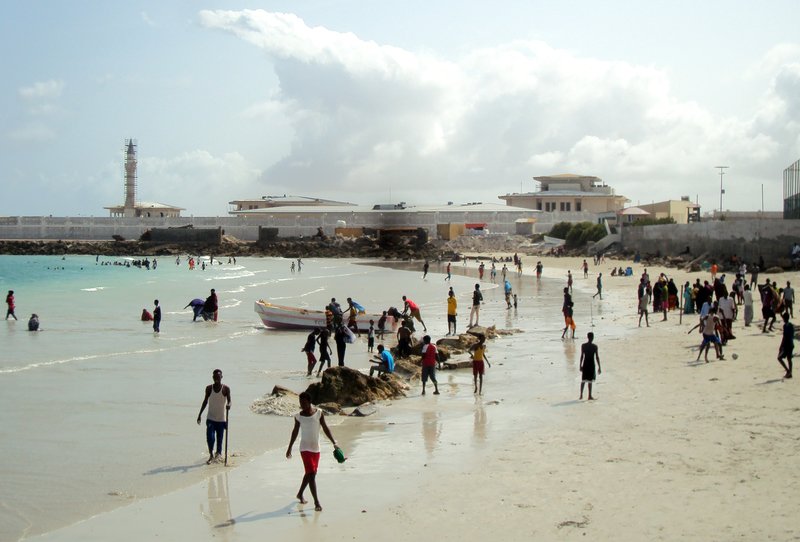
A view of Lido Beach in Mogadishu – © Mohamed Odowa, dpa
Mogadishu (dpa) – Couples are walking leisurely along the rocky shoreline, bathers splash in the waves, young boys kick a ball in the sand. Under a row of shady umbrellas, beachfront restaurants serve seafood and tea.
Only four years ago, Lido Beach was a dangerous no-go zone in Somalia’s war-torn capital, Mogadishu. Islamist militant group al-Shabaab partially controlled the city. Violence and bloodshed confined people to their homes.
Today, hundreds of families come to relax on Mogadishu’s coastline each weekend. Hotels are being built along the shore and restaurants have opened, while vendors sell ice cream on the beach.
“I was born and raised in a hostile environment, in Mogadishu, now we see a promising future,” Asho Elmi tells dpa while lugging a heavy cooler box filled with soft drinks and ice cream along Lido Beach.
“The fear has gone. We work here until 9:30 pm” when the sun goes down, the 20-year-old says.
Somalia suffered two decades of anarchy and fighting between rival warlords after the overthrow of President Siad Barre in 1991.
Only since an internationally-backed government was installed in 2012 and al-Shabaab pushed out of Mogadishu and other strongholds has the East African nation of roughly 10 million people become more stable.
Its economy grew by 3.7 per cent in 2014, with growth projected to reach 2.7 per cent this year, according to the International Monetary Fund (IMF).
“Even though the political and security situations remain challenging, Somalia has made tremendous progress,” the IMF announced in late July.
Somalis can feel this progress in their day-to-day lives.
Mogadishu’s construction industry is booming. Multi-storey buildings are being erected in the city centre, while the bullet-riddled facades the capital was famous for are disappearing behind new coats of plaster and paint.
Visitors now have a choice of more than 200 hotels in Mogadishu, up from a mere 12 in 2012.
In the heart of the city, Bakaraha Market with its hundreds of shops selling fruit and vegetables, clothes and household goods – once a battlefield between peacekeeping troops and al-Shabaab terrorists – has again become a bustling commercial district where residents do their daily shopping and chat in small restaurants and coffee houses.
For the first time since 1991, “modern” imported products like energy drinks are for sale here.
“Security has improved greatly. That gave the people, especially the business community, confidence to keep their places open, even at night time,” says Nije Sharif, who manages a section of the market.
Streets are dotted with internet cafes in a city where most residents were cut off from the rest of the world a few years ago.
“A new Somalia is emerging,” believes Ahmed Tall, a business and accountancy lecturer at Mogadishu’s SIMAD University.
A sure sign of the economic upswing is the introduction of a new banking system in Somalia. Local Premier Bank struck a deal with Mastercard and in May issued a debit card for the first time in the country’s history.
Instead of queuing for hours at the tellers inside a bank, Somalis can now withdraw money at an ATM or pay in big stores with their card – a major advantage in a city where carrying larger amounts of cash is still regarded as extremely dangerous.
Somalia’s challenges remain immense. It continues to be one the world’s “failed states,” worse than Afghanistan, Syria or Yemen, according to an annual index by The Fund for Peace.
Al-Shabaab, albeit weakened, still regularly attacks government officials and civilians, causing hundreds of deaths each year. Crime is rife, infrastructure minimal and poverty high.
But there is a new optimism to overcome these barriers, says Premier Bank managing director Mahat Mohamed Ahmed.
“We see banks, insurance companies, security firms, real estate, health industry and hospitality all undergoing major expansions,” Ahmed explains.
For Somalis, those are all small but important steps in the right direction.
Source: dpa


Leave a Reply